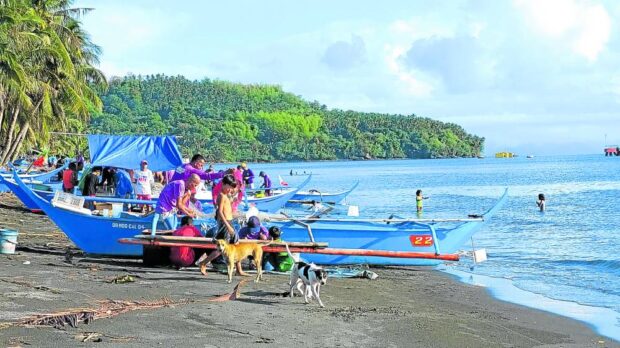
SEASIDE LIVING Residents of Barangay Lazareto in the City of Calapan, Oriental Mindoro, spend their day along the shoreline amid the continuing fishing ban imposed on the area that has been affected by the oil spill from the sunken MT Princess Empress in this photo taken on May 6. —MADONNA T. VIROLA
CITY OF CALAPAN—Oriental Mindoro Gov. Humerlito Dolor on Monday lifted the fishing ban in at least seven towns in the province, saying the coastal waters in these areas were already “within acceptable standards” for fishing activities based on recent sample tests.
The fishing ban, however, will stay in the waters of the capital Calapan City and in the towns of Naujan, Pola, Pinamalayan, Gloria and Bansud “due to the risk of contamination by the oil” that continued to linger in the waters off these areas, Dolor said.
At a press briefing on Monday, Dolor said fishing was already allowed in the towns of Bongabong, Roxas, Mansalay, Bulalacao, Puerto Galera, San Teodoro and Baco because the levels of oil and grease in these areas were below the standard limit of 3.0 milligrams per liter. The most recent tests were done on April 17 and April 24.
The governor said residents in towns where the fish ban remained in effect could still go to other parts of the province where fishing was already allowed so they could make a living.
The Bureau of Fisheries and Aquatic Resources (BFAR) earlier recommended alternative fishing grounds to help affected fishers. These are the municipal waters of Paluan, Abra de Ilog, San Jose and Magsaysay in Occidental Mindoro; Boac and Gasan in Marinduque; and Concepcion in Romblon.
Recommendations
Dolor said he heeded the recommendations of the Philippine Coast Guard (PCG), the Department of Health (DOH), the BFAR and oil spill experts to lift the fish ban due to the improving water conditions in some of the areas that were hit by the oil spill caused by MT Princess Empress, which sank off Naujan town on Feb. 28 while carrying 800,000 liters of industrial fuel.
The spill caused massive coastal damage to Oriental Mindoro and went as far as Caluya Island in Antique and Taytay town in Palawan.
The PCG recently declared it had completed almost 80 percent of its cleanup operations, while the DOH said their samples from drinking water in some areas in Oriental Mindoro yielded “favorable results.”
Prof. Hernando Bacosa, lead expert for oil spills at the Department of Science and Technology, also cited test results showing that toxic polycyclic aromatic hydrocarbons that were found in fish species in these seven towns were already in low concentration.
The provincial government enforced a fishing ban in the affected areas in early March to prevent its residents from ingesting contaminated water and seafood.
As of April 26, the estimated losses to agriculture and fisheries had reached P3 billion, according to the Office of Civil Defense. Nearly 200,000 people, mostly in Oriental Mindoro, and in some parts of Batangas, Marinduque, Romblon, Palawan and Antique provinces were affected by the oil spill.
In Oriental Mindoro alone, more than 75,000 families living in coastal villages continued to reel from the widespread oil spill, said Dolor.
Continuous monitoring
Dolor said monitoring of all sites would continue according to the scheduled sampling plan.
“Precautionary measures shall be implemented in the event that the levels of contamination have increased such that the risks to the food safety of fish and fisheries products become significant,” said Dolor during the press briefing.
But Protect VIP, a coalition of communities, sectors and advocates for the protection of the Verde Island Passage (VIP), was alarmed by Dolor’s decision to lift the fishing ban in some towns.
VIP, the body of water between Mindoro Island and Batangas City and is considered as the center of the world’s biodiversity, was briefly hit by the oil spill in March.
In a statement, Protect VIP said it understood the urgency of letting the fisherfolk make a living, “but we question why the ban is being lifted when MT Princess Empress continues to leak toxic oil into the waters of VIP,” and could cause ailments on fishermen if they encounter spill-affected waters.
The BFAR, in a separate statement, said it recommended the lifting of the fishing ban in Bongabong, Roxas, Mansalay, Bulalacao, Puerto Galera, Baco and San Teodoro as water in these towns were already within acceptable standards for fishing activities.
But it said the ban should remain in Calapan City and the towns of Naujan, Pola, Pinamalayan, Gloria and Bansud as recent analyses revealed the risk of contamination from traces of oil that have yet to be removed from these areas.
The Department of Environment and Natural Resources (DENR) had estimated that the spill’s damage to the ecosystems (mangrove areas, seagrass beds and coral reefs) in Oriental Mindoro, Antique and Palawan was about P7 billion.
The DENR said the projected amount was not yet final as the actual value of losses following the incident would depend on ground validation, thorough habitat impact assessments and further economic valuation exercises.
—WITH A REPORT FROM JORDEENE B. LAGARE INQ
RELATED STORY:
Oriental Mindoro gov lifts fishing ban in 7 towns